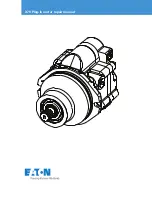
ENGINE SERVICE MANUAL
3
Safety Information
This
manual
provides
general
and
specific
maintenance procedures essential for reliable engine
operation and your safety. Since many variations in
procedures, tools, and service parts are involved,
advice for all possible safety conditions and hazards
cannot be stated.
Read safety instructions before doing any service and
test procedures for the engine or vehicle. See related
application manuals for more information.
Obey Safety Instructions, Warnings, Cautions, and
Notes in this manual.
Not following warnings,
cautions, and notes can lead to injury, death or
damage to the engine or vehicle.
Safety Terminology
Three terms are used to stress your safety and safe
operation of the engine: Warning, Caution, and Note
Warning
: A warning describes actions necessary to
prevent or eliminate conditions, hazards, and unsafe
practices that can cause personal injury or death.
Caution
:
A caution describes actions necessary
to prevent or eliminate conditions that can cause
damage to the engine or vehicle.
Note
: A note describes actions necessary for correct,
efficient engine operation.
Safety Instructions
Work Area
•
Keep work area clean, dry, and organized.
•
Keep tools and parts off the floor.
•
Make sure the work area is ventilated and well lit.
•
Make sure a First Aid Kit is available.
Safety Equipment
•
Use correct lifting devices.
•
Use safety blocks and stands.
Protective Measures
•
Wear protective safety glasses and shoes.
•
Wear correct hearing protection.
•
Wear cotton work clothing.
•
Wear sleeved heat protective gloves.
•
Do not wear rings, watches or other jewelry.
•
Restrain long hair.
Vehicle
•
Shift transmission to park or neutral, set parking
brake, and block wheels before doing diagnostic
or service procedures.
•
Clear the area before starting the engine.
Engine
•
The engine should be operated or serviced only
by qualified individuals.
•
Provide necessary ventilation when operating
engine in a closed area.
•
Keep combustible material away from engine
exhaust system and exhaust manifolds.
•
Install all shields, guards, and access covers
before operating engine.
•
Do not run engine with unprotected air inlets or
exhaust openings.
If unavoidable for service
reasons, put protective screens over all openings
before servicing engine.
•
Shut engine off and relieve all pressure in the
system before removing panels, housing covers,
and caps.
•
If an engine is not safe to operate, tag the engine
and ignition key.
Fire Prevention
•
Make sure charged fire extinguishers are in the
work area.
NOTE: Check the classification of each fire
extinguisher to ensure that the following fire
types can be extinguished.
1.
Type A — Wood, paper, textiles, and rubbish
2.
Type B — Flammable liquids
3.
Type C — Electrical equipment
Batteries
•
Always disconnect the main negative battery
cable first.
•
Always connect the main negative battery cable
last.
•
Avoid leaning over batteries.







































